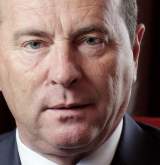Banks should rethink their consulting role
“From the outside, the market looks the same: banks’ products and services haven’t changed. But the factors that guide banks’ actions have changed. From the inside, the situation has changed primarily due to the dwindling demand for banking products and services”, said Patrick Gelin (photo), chairman and chief executive of BRD-Groupe Societe Generale, the country’s second largest bank by assets.
BRD’s total bank lending increased to 32.2 bln lei in June 30, 2009, up 11%from 29.12bln lei in first half 2008. Compared to first half 2007, the Societe Generale-owned bank’s loan book is 54.8% up. The bank’s deposit portfolio remained stable.
“It is not an single-faceted problem. The financial crisis has taken its toll on clients too, as many of them are now struggling to meet their loan repayments. Many of the bank’s resources are now steered towards loan restructuring, and some lenders are seeing NPL ratio climbing in their loan book” , chief executive of BRD said.
BRD reported first-half net profit of 425 mln lei, 17.4% below year-ago level, following weak credit demand and increased risks.
“It is very important for banks to rethink their consulting role, to assist their clients and help them overcome this difficult period”, said Patrick Gelin.
BRD�s measures to weather crisis: cost reduction and risk management
“BRD has seen the signs of a possible recession in Romania in early 2008, and has constantly taken cost-containment and risk management measures ever since. Our relatively comfortable position is the result of years-long efforts to bring BRD to the level of best practices, especially in risk tracking. On the other hand, our client portfolio is no doubt superior to the bank system’s as a whole”, said Patrick Gelin.
The chief executive has listed 3 factors that could reignite lending activity:
- positive economic growth in Western European countries;
- an adjustment of real estate prices, so as to move the market from the standby mode;
- completion of a number of large infrastructure projects.
BRD�s forecasts for Romanian economy
“Under these assumptions, we have put in place rigorous cost-containment measures, while scanning the environment for any commercial development opportunity to take advantage of the distressed situation of other banking institutions”, said Patrick Gelin.
BRD’s chairman added that Romania’s anti-crisis plan consisted of projects financed by European funds, but the usage level of these funds had been weak so far. Public power must stimulate authorities to speed up the process.
Recently, the head of BRD has identified two other hotspots for the development of Romania, namely the management of public finances and human resources.
























































![HR [PLAY] Tech Workout - 11...](https://www.wall-street.ro/image_thumbs/thumbs/973/973fe0a3888d417feff63de42e814180-260x260-00-65.jpg?v=1713488560)










